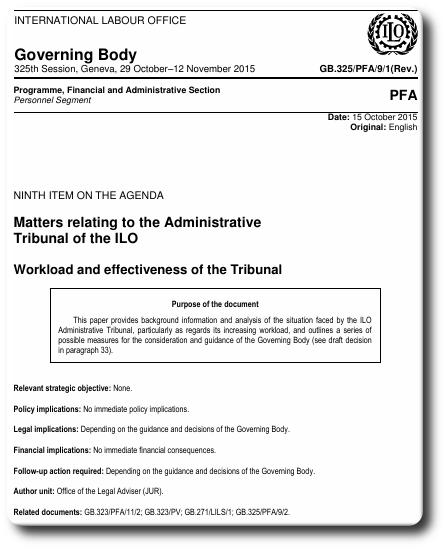

Full report here
WHEN the EPO's monarch in chief, Mr. Battistelli, sacks staff representatives (because he feels like it) he pretends they have an appeal process (juridical) to fall back on, even if the ILO takes many years to take on cases (people must seek alternative employment in the interim) and the outcome is often disappointingly biased.
Will ILO-AT dismiss the EPO?
The current developments at the ILO-AT are another threat to the immunity of the EPO. The vast majority of the complaints brought by staff against its employer are lost. Maybe this should not come as a surprise, given that the Tribunal’s judges are paid on a case-by-case basis by the defendant organisation. It would seem that the ILO-AT and the EPO are a marriage made in heaven. Curiously, however, the Tribunal does not seem to be happy with the EPO. It recently issued a document in which the Tribunal blames the EPO for its increasing backlogs. It is clear that the EPO’s internal conflict resolution mechanisms have become ever more dysfunctional, see e.g. CA/21/15 which points 13-15 and 59-64 that show a vanishingly small success rate. However, in doing so the Tribunal passes in silence over changes in its jurisprudence that strongly contribute to its backlog like demanding that each staff member who is negatively affected by a general decision file his or her own individual complaint rather than accepting one complaint for all. A lack of consistency and a tendency to dismiss cases on procedural issues rather than to decide on the substance further create further legal uncertainty and contribute to an increase in the number of appeals. In a proposal to amend its Statutes, to be submitted to the ILO Governing Body in June, the Tribunal now plans to withdraw its acceptance for organisations when it finds that their internal conflict resolution mechanisms are insufficient. Not only that: it also plans to give itself the authority to expel existing “client” organisations that do not fulfil its conditions. It seems clear that the EPO is first in line. If so then the EPO would be the first organisation ever to be ejected from the Tribunal. This would be a major embarrassment. The Organisation would be obliged to provide an alternative fast, unless it wants to see its immunity lifted by national courts for which it would be very clear that staff in the EPO no longer have access to justice. Because access to the ILO-AT is fixed in the EPC (Article 13 EPC), such a change would require a diplomatic conference..
Summary injustice
The EPO made headlines by refusing to accept the ruling of a Dutch court of second instance and announcing – through a Vice-President – that it would even ignore the ruling of the Dutch Supreme Court, should that ruling not be in its favour. A similar disdain is shown by ILO-AT in its Judgment 3563, concerning an application for review of the earlier Judgment 3297 (dismissal on accusation of fraud). The Tribunal upheld the dismissal. After the earlier judgment the complainant was acquitted of the same accusations by a Dutch criminal court. He requested the ILO-AT (an administrative tribunal that limits itself to written procedures, without an investigation and without hearings) to reconsider its judgment in the light of the findings of the Dutch specialised (criminal) court that is much more thorough in its workings. The Tribunal considered that the findings of the Dutch court were irrelevant and refused reconsider its position. The application for review was summarily (sic) dismissed.